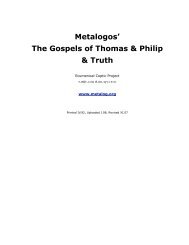Andrew Louth - Syriac Christian Church
Andrew Louth - Syriac Christian Church
Andrew Louth - Syriac Christian Church
You also want an ePaper? Increase the reach of your titles
YUMPU automatically turns print PDFs into web optimized ePapers that Google loves.
38 INTRODUCTION<br />
THE WAY OF LOVE 10<br />
As his second letter, one of the earliest of his writings, makes clear,<br />
for Maximus, training in <strong>Christian</strong>ity is a training in love (for which<br />
Maximus usually uses the word agapê, but sometimes the word erôs: I<br />
do not think we should make any great issue over his use of these<br />
words). 11 His first Century on Love begins:<br />
Love is a holy disposition of the soul, in accordance with which<br />
it values knowledge of God above all created things. We cannot<br />
attain lasting possession of such love while we are still attached<br />
to anything worldly.<br />
Dispassion engenders love, hope in God engenders dispassion,<br />
and patience and forbearance engender hope in God; these in<br />
turn are the product of complete self-control, which itself springs<br />
from fear of God. Fear of God is the result of faith in God.<br />
(CC I.1–2)<br />
Similarly, when at the beginning of the next century on love, he comes<br />
to talk about pure prayer, he defines this in terms of love: ‘he who<br />
truly loves God prays entirely without distraction, and he who prays<br />
entirely without distraction loves God truly’ (CC II.1). Whereas<br />
Evagrius’ doctrine of prayer and the spiritual life is about how the soul<br />
is to regain the state of being pure mind from which it has fallen, for<br />
Maximus the spiritual life is about how we love. In our fallen state,<br />
apart from the call of God, we are in a state of self-love, philautia. It is<br />
from this condition that all the passions flow: Maximus calls it the<br />
‘mother of passions’. 12<br />
Love is about how we relate—to God, to other people (and, indeed,<br />
to ourselves): Maximus defines it as an ‘inward relationship’ of the<br />
utmost universality (Ep. 2:401D). Instead of regarding the passions<br />
simply as registering the state of the soul, Maximus sees the passions<br />
as affecting our relationships with other people, and indeed as being<br />
provoked by such relationships. So, though he makes much use of<br />
Evagrius’ eight principal passions, he also gives a prominent place to<br />
other passions that Evagrius ignores (or subsumes under the others),<br />
especially passions such as resentment (or rancour) and envy, that are<br />
essentially about our relationships with others. So we find Maximus<br />
saying:<br />
If you harbour resentment against anybody, pray for him and<br />
you will prevent the passion from being aroused; for by means of<br />
prayer you will separate your grief from the thought of the wrong<br />
he has done you. When you have become loving and




